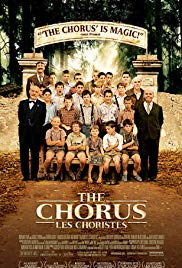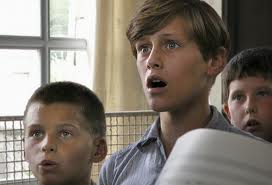1. See Discussion Questions for Use With any Film that is a Work of Fiction.
2. The film opens and closes with two old men looking back at the events that occurred while they were students at Fond de L’Etang. How do the characterizations of these two men logically follow the characterization of each as children? Consider physical appearance, life’s work, and mood.
Suggested Response:
The orchestra conductor is Morhange, the soloist in the chorus years earlier. He is now a master musician, appearing dignified, solemn, and reserved. He takes time out to deal with his mother’s death. The audience sees that the talent in the boy has flowered into accomplishment in the man. The other old man, Pepinot, is good-natured, less elegant than Morhange, and open-hearted. This, too, is a logical development of the young Pepinot, a winsome orphan who waited each Saturday for parents who would never appear.
3. The story of their childhood, as recalled by the two old men, opens with the camera approaching a gate with the words “Fond de L’Etang” beckoning the audience forward. These words mean “bottom of the pond”. In English, there is a similar expression: the bottom of the barrel. What symbolic meaning is suggested here?
Suggested Response:
The student body consists of young boys with behavior problems, orphans, or boys whose parents cannot take care of them. They are at the bottom of the social order. In one sense, the students are the castaways, the rejects of society, the bottom of the barrel.
4. The Prefect, Clement Mathieu, defines himself as a failed musician. What evidence is offered throughout the film that reveals this to be either true or false?
Suggested Response:
Mathieu’s position at the school is low in status and has nothing to do with music until he decides to create the choir providing his own compositions for the students to sing. The choir is a great success but Mathieu allows the school’s director to take all the credit. Mathieu asserts himself only after he is fired. As he leaves the school, Mathieu declares himself to be a failure. However, in the farewell that the boys give him and in Morhange’s success, we see how important Mathieu’s musical skills have been to others. Lack of fame and fortune do not make an individual a failure.
5. What change can be seen in the arithmetic teacher and how does it relate to the theme of the film?
Suggested Response:
Just as the music changes the students, music changes this man. He grows from a humorless, uptight teacher into a person delighted with the prospect of having a vacation in a home with a piano. He is deeply moved by the choir. He begins to smile.
6. “Action-Reaction” is the term used in the film to describe the disciplinary method used at the school. What is this method all about? Does it exist at your school or in your home?
Suggested Response:
This term describes an attempt to apply a principle of the physical sciences to disciplinary procedures in a school. Isaac Newton’s Third Law of Motion provides that for every action there is an equal and opposite reaction. As a disciplinary tool, this means that any harm or disorder will be followed by an equal measure of punishment and enforced order. Examples from students’ schools or personal lives will vary.
7. Do you believe that society at large objects to or supports the Action-Reaction form of discipline? What is your opinion of this method of discipline?
Suggested Response:
Opinions will vary and there are no correct or incorrect answers. There are only strong or weak responses depending upon the facts and logic marshaled to support the conclusion. Strong responses will mention that principles of physical science do not necessarily apply to the social sciences.
8. Mondain, the bad boy who comes to the school in an experiment with liberal education, gives Mathieu a friendly nod as he is being taken away by the police. What do you think he intends to communicate with this gesture?
Suggested Response:
Mondain has been treated unjustly and he has seen Mathieu behave as someone who believes in justice. The nod could mean: See, there is no justice. Or, it could mean: I will show you justice soon. The students will vary in their responses to this question. Responses need to be internally consistent, meaning true to the facts presented in the film.
9. What is the purpose behind Mathieu’s consistent efforts to cover for the boys’ bad behavior?
Suggested Response:
Mathieu may be trying to show the boys a more humanitarian method of dealing with their fellow human beings. He may be revolting against the Action-Reaction system put in place by Rachin. Some students may suggest that he is weak and wants the boys to like him. Answers will vary. There are no correct or incorrect answers but only strong or weak responses depending upon the facts and logic marshalled to support the conclusion.
10. Give illustrations of what Mathieu does to cause Morhange to change.
Suggested Response:
Early in the film, Mathieu puts Morhange in charge of the class when he leaves to tend to a problem. Later, he allows Morhange to rejoin the choir as a way to avoid another sort of punishment. He then gives the boy a solo. Toward the end of the film, Mathieu punishes Morhange by taking away his solo; however, during an important performance, Mathieu sees that Morhange has been punished enough and wants desperately to work with the choir again. Morhange is invited back into the fold and shines. He is changed.
11. When Mathieu is beginning to write music again he says that “nothing is truly ever lost.” What is he talking about?
Suggested Response:
Mathieu is talking about both his music and the boys themselves. He will now begin to use his music, which he had considered lost, to affect the boys, whom others have cast away — in the symbolism of the story, to the bottom of the pond — and who may believe themselves to be lost. Mathieu, however, believes that the boys are capable of being saved. In a voice-over, Mathieu ponders whether these kids really are a lost cause. He sees hope.
12. What explains Morhange’s hostility to Mathieu’s interest in his mother?
Suggested Response:
Morhange has very little to hold onto in life; he does not want to share his mother. Later Mathieu explains the boy’s possessiveness to Violetta, the boy’s mother, by telling her about how she is every boy’s dream mother. Morhange is sensitive to the image his mother casts in the eyes of the other boys.
13. Mondain provides a significant complication for Mathieu. What is it?
Suggested Response:
Mondain challenges Mathieu’s liberal ideals. Mathieu stays true to his sense of justice. Mondain is cruel to others and Mathieu calls him on this behavior but does not resort to cruelty in his treatment of the boy. Mondain is unjustly accused of stealing from the school and is badly abused by Rachin. His attack in response to half an hour of slapping illustrates how violence begets violence. He sets the school on fire, thus further illustrating how injustice begets violence.
14. The boys are happier now that they are singing in the choir. They are more playful and cooperative. What is your explanation for this change?
Suggested Response:
There are several answers with merit; they include: someone believes in the boys; they are proud of their accomplishments and their self-esteem has increased; they have hope that life in the school will be better; the self-expression that they are permitted in singing allows them an outlet for their emotions.
15. Mathieu asks the boy who was found to have stolen the money, a crime for which Mondain was punished, what he wanted to buy. The boy answers A hot air balloon. What does this symbolize?
Suggested Response:
A hot air balloon could symbolize freedom, escape, beauty, or a deep desire to float above all of the loneliness and problems of earth-bound experience. Answers will vary. There are no correct or incorrect answers but only strong or weak responses depending upon the facts and logic marshaled to support the conclusion.
16. When the choir is canceled as a form of punishment for Mondain’s having set fire to the school, Mathieu takes it underground. What could this mean metaphorically?
Suggested Response:
Since the film is set in post-war France, there is the suggestion that the underground is a reminder of the efforts of the resistance in several countries during World War 11. Partisans fought mightily against the Nazi occupations in France, Italy and elsewhere. The “underground” is thus a metaphor for resistance to tyrannical authority.
17. Is Mathieu helping Morhange because he wants to impress the boy’s mother or because the boy deserves such treatment?
Suggested Response:
Answers will vary. The best responses will look to the film for evidence of the opinions given and will mention that Morhange, despite his mother and all she means to Mathieu, is an exceptional singer who well deserves help from someone who knows and loves music. A strong response would be that Mathieu had both motives and that when Violetta became engaged and out of reach, Mathieu continued his interest in the boy. Mathieu is portrayed as the kind of person who can set his ego aside. He does this several times with the boys and with Rachin.
18. What irony can be seen in the relationship between Mondain and Rachin which suggests that what-goes-around-comes-around?
Suggested Response:
Just as Rachin is about to receive an award for his humanitarian methods of running the school, he is called back to Fond de L’Etang which is burning down. The irony lies in the fact that the triumph of Rachin’s hypocrisy, a ceremony honoring him as a humanitarian, is interrupted by Mondain’s pay-back for the injustice meted out to him by Rachin.
19. What personal characteristics in both the workers and the boys at the school resulted in Rachin’s dismissal as the director of the school?
Suggested Response:
It took courage for the employees, such as Maxence, to go to the authorities and explain the malevolence of Rachin. The boys, as well, mustered courage in order to testify against the director.
20. What is the source of the exhilaration Mathieu feels as he leaves Fond de l’Etang?
Suggested Response:
When Mathieu walks away from the building after he has been unjustly fired, he hopes the boys will at least break the rules to come and say goodbye. He is at first disappointed but then the boys begin singing and sending paper airplanes with messages down on the path before Mathieu. He realizes how much the boys care for him as he hears the music that he knows has become essential to their lives. The boys feel hopeful. Mathieu may be a failed musician and an unemployed perfect, but he has influenced the lives of the boys at the school; he is a happy man.
21. It first appears that Mathieu will leave the boarding school alone on a Saturday afternoon without seeing any of his students. As he is about to board the bus, Pepinot comes to ask Mathieu to take him and Mathieu says he cannot. Pepinot watches as the bus pulls away, then stops. Pepinot is taken aboard and Mathieu raises Pepinot as his son. What do you think made Mathieu change his mind about taking Pepinot with him?
Suggested Response:
Responses will vary. Mathieu always had a soft spot for Pepinot, the youngest and loneliest boy at the school who, every Saturday, waited at the gates for his parents to come and get him. Mathieu, feeling the joy and optimism that came from the realization that he had been important to the students, was able to risk the potential problems that may have come with doing the right thing, taking Pepinot with him. A feeling of love drove his actions.



